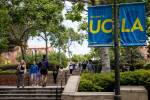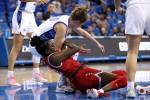Regents will vote on fee proposals
The higher education system's Board of Regents is set to approve small increases in dozens of student fees and to add some new fees at the state's colleges and universities.
Examples include a new $60 GED testing fee at the College of Southern Nevada, a $25 increase in the graduation fee at the University of Nevada, Las Vegas and a new $25 per credit distance education fee at Nevada State College.
Regents also are expected to approve differential tuition proposals at UNLV and the University of Nevada, Reno, which have been in the works for months. New details in that proposal suggest UNLV expects to raise an additional $3 million in the spring and summer semesters in 2012, when the fees would be implemented.
The new and increased fees would raise an estimated $487,200 for UNLV, $695,000 for the state college and $558,593 for the community college.
The fees cover a myriad of things, including expensive equipment in CSN's dental hygiene program, new student identification cards and drug testing for health sciences students.
Those fees are in addition to tuition and can add up to hundreds of dollars, often depending on the subject area a student is studying.
With the distance education fee at the state college, the only other fee proposed there is a $5 per credit student success fee, aimed at helping to pay for the academic center. The center is available for students who need tutoring or other related help with their classes.
At CSN, there are more than a dozen new or increased fees proposed. Testing fees for health students make up the bulk of them.
At UNLV, many of the new or hiked fees are for courses within the college of education. There will be a $150 increase in the student teaching fee. The university says the fee has not increased since 1996, which has caused the program to run at a deficit.
The university also proposes increases in fees for some engineering and golf courses.
If OK'd by the regents, all the new fees would go into effect in the fall 2011 semester. The differential tuition charges, however, would not go into effect until the spring 2012 semester.
Under that program, the state's two universities would charge more for high-cost, high-demand programs than they charge for most other programs.
UNLV plans to double the per-credit fee in its nursing, architecture and physical therapy programs. The course fees and surcharges would not double.
For a typical undergraduate taking 15 credits per semester, the additional cost would be about $4,700 a year.
UNR has taken a slightly different approach. Only its engineering programs would be affected, and the additional cost ranges from $21.50 per credit to $100 per credit, depending on the course.
A rule previously adopted by the regents dictates that 15 percent of the money raised through the differential tuition charges must pay for need-based financial aid within the program. The rest of the money must stay within the program.
UNLV says the extra money in the architecture program would add more than $10,000 for need-based financial aid in that program. The rest of the money raised would be used to hire more student workers so the program could keep its lab open longer and update lab and classroom equipment.
The extra charges in the nursing program would add almost $250,000 a year for need-based financial aid. The rest would help pay professional staffers and help fund clinical faculty.
The extra charges in the physical therapy program would fund $10,000 a year in need-based aid. The rest would be used to fill a frozen faculty position and to hire more staff.
Regents are scheduled to vote on the proposals at the Dec. 2 and 3 meeting at Desert Research Institute.
Contact reporter Richard Lake at rlake@review journal.com or 702-383-0307.























